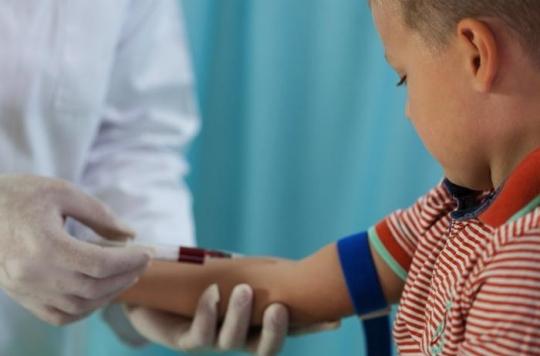The blood test is unfortunately the corollary of a quality medical follow-up. Here are some tips to help your child experience this event well.

Because they are necessary for good medical follow-up, it is useful to know how to manage your children’s fear of needles.
Numbing ointment
To do this, know that it is possible to put the skin to sleep with an anesthetic ointment two hours before the blood test. A numbing patch will have the same causes and effects. If the child is very nervous, it is also possible to go to a hospital to inhale MEOPA gas before meeting the nurse. This will help her relax.
Going to the place where the injection will take place a few days before can also help the child to better understand the event. Looking at pictures of needles and blood samples is also a good approach.
You can make this moment faster for him by preparing his body: the absorption of liquids swells the veins and accelerates the blood flow. He should therefore be given plenty of water to drink.
Stay next to your child
During the procedure, it is a good idea to stay next to your child, advising them to look at you rather than focusing on the needle. Talking to her can also help her deal with stress better. More generally, explaining to your child why he is going to have an injection and answering all his questions will allow many of his anxieties to be relieved. This serves, in psychological jargon, to “rationalize the event”. Last advice: ask your child to breathe gently, this will help to relax them completely.
After the bite, rewarding her child with a small gift will allow him to reduce the unpleasant sensations caused by the bite, and better deal with the one after.
Cognitive and behavioral therapy
If, despite all of these precautions, your child still has panic attacks at the thought of having an injection, he or she may be suffering from belonephobia, more commonly known as “needle phobia”. This category of phobia results in slow blood flow, as well as a drop in heart rate and blood pressure. In the most severe cases, the mere fact of contemplating the confrontation with the object causes cold sweats, tremors, and vagal discomfort.
In this case, it is advisable to have your child follow cognitive and behavioral therapy that will allow him to domesticate his fear and trivialize it. The psychologist will focus on understanding where this fear of needles comes from (has he heard stories of painful injections? Read novels or seen horror films on the subject? “stung” in the past? …)
Needle phobia is common. Researchers estimate that between 1 in 10 or 20 adults and 1 in 10 adults have a phobia of needles.

.
















